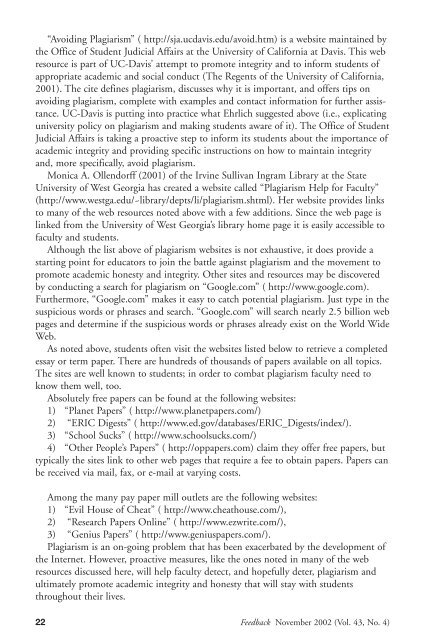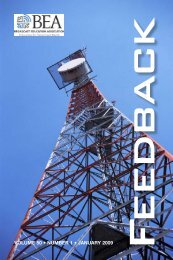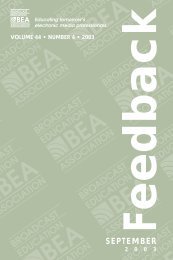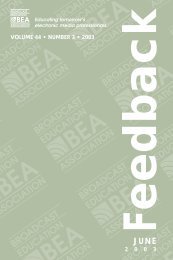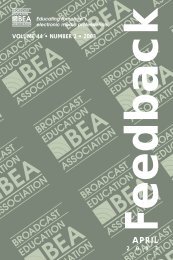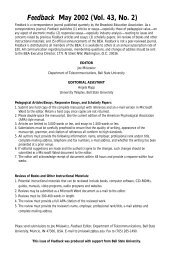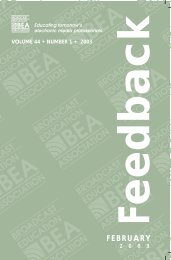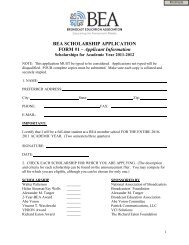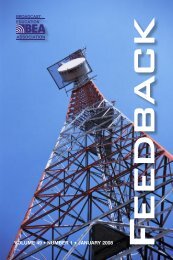Feedback November 2002 (Vol 43 No 4)
Feedback November 2002 (Vol. 43, No. 4) - Broadcast Education ...
Feedback November 2002 (Vol. 43, No. 4) - Broadcast Education ...
You also want an ePaper? Increase the reach of your titles
YUMPU automatically turns print PDFs into web optimized ePapers that Google loves.
“Avoiding Plagiarism” ( http://sja.ucdavis.edu/avoid.htm) is a website maintained bythe Office of Student Judicial Affairs at the University of California at Davis. This webresource is part of UC-Davis’ attempt to promote integrity and to inform students ofappropriate academic and social conduct (The Regents of the University of California,2001). The cite defines plagiarism, discusses why it is important, and offers tips onavoiding plagiarism, complete with examples and contact information for further assistance.UC-Davis is putting into practice what Ehrlich suggested above (i.e., explicatinguniversity policy on plagiarism and making students aware of it). The Office of StudentJudicial Affairs is taking a proactive step to inform its students about the importance ofacademic integrity and providing specific instructions on how to maintain integrityand, more specifically, avoid plagiarism.Monica A. Ollendorff (2001) of the Irvine Sullivan Ingram Library at the StateUniversity of West Georgia has created a website called “Plagiarism Help for Faculty”(http://www.westga.edu/~library/depts/li/plagiarism.shtml). Her website provides linksto many of the web resources noted above with a few additions. Since the web page islinked from the University of West Georgia’s library home page it is easily accessible tofaculty and students.Although the list above of plagiarism websites is not exhaustive, it does provide astarting point for educators to join the battle against plagiarism and the movement topromote academic honesty and integrity. Other sites and resources may be discoveredby conducting a search for plagiarism on “Google.com” ( http://www.google.com).Furthermore, “Google.com” makes it easy to catch potential plagiarism. Just type in thesuspicious words or phrases and search. “Google.com” will search nearly 2.5 billion webpages and determine if the suspicious words or phrases already exist on the World WideWeb.As noted above, students often visit the websites listed below to retrieve a completedessay or term paper. There are hundreds of thousands of papers available on all topics.The sites are well known to students; in order to combat plagiarism faculty need toknow them well, too.Absolutely free papers can be found at the following websites:1) “Planet Papers” ( http://www.planetpapers.com/)2) “ERIC Digests” ( http://www.ed.gov/databases/ERIC_Digests/index/).3) “School Sucks” ( http://www.schoolsucks.com/)4) “Other People’s Papers” ( http://oppapers.com) claim they offer free papers, buttypically the sites link to other web pages that require a fee to obtain papers. Papers canbe received via mail, fax, or e-mail at varying costs.Among the many pay paper mill outlets are the following websites:1) “Evil House of Cheat” ( http://www.cheathouse.com/),2) “Research Papers Online” ( http://www.ezwrite.com/),3) “Genius Papers” ( http://www.geniuspapers.com/).Plagiarism is an on-going problem that has been exacerbated by the development ofthe Internet. However, proactive measures, like the ones noted in many of the webresources discussed here, will help faculty detect, and hopefully deter, plagiarism andultimately promote academic integrity and honesty that will stay with studentsthroughout their lives.22<strong>Feedback</strong> <strong><strong>No</strong>vember</strong> <strong>2002</strong> (<strong>Vol</strong>. <strong>43</strong>, <strong>No</strong>. 4)


